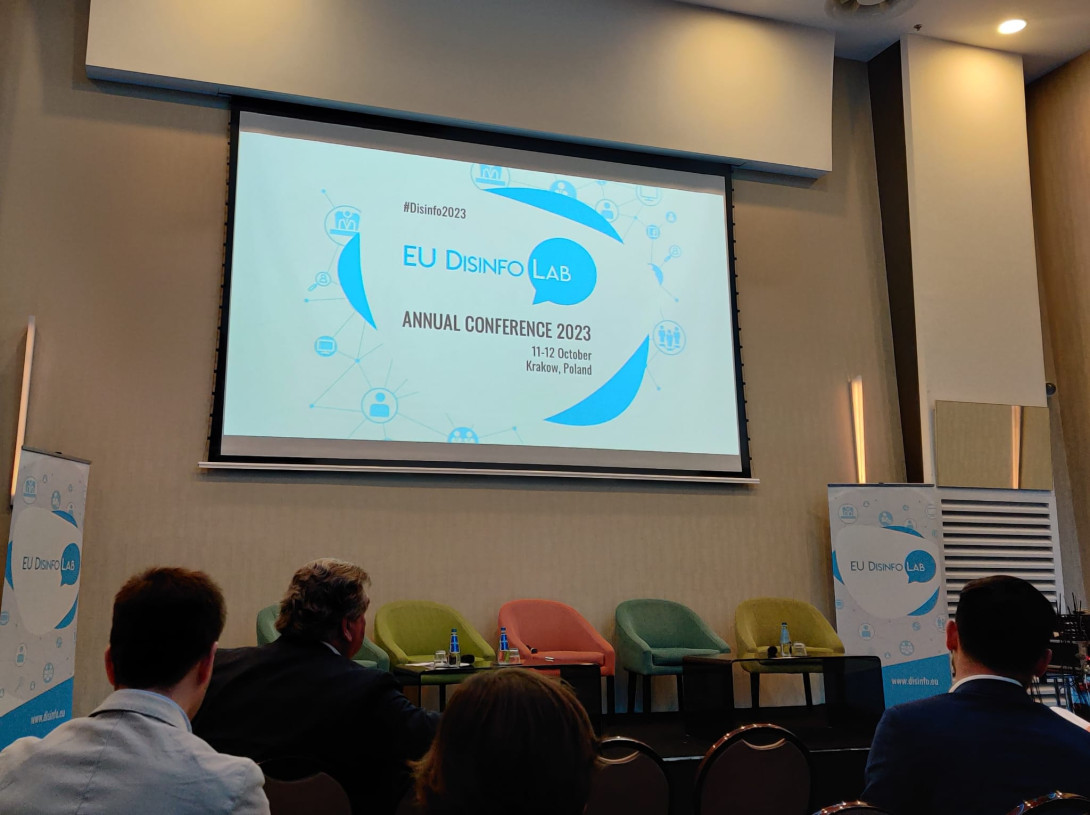
This year’s EU DisinfoLab conference took place in Krakow from 11 to 12 October, bringing together over 300 renowned professionals from a diverse range of backgrounds. Over the course of two days, participants delved deep into the complexities of contemporary disinformation challenges, touching on regulation, transparency, access to data and the impact of disinformation on individuals and society at large. As such, the conference served as a fantastic opportunity to exchange with relevant stakeholders in the field, explore potential synergies and introduce the community to the work done within FERMI: developing tools to prevent disinformation-induced crimes and increasing resilience against disinformation campaigns.
Day One
Day one commenced with two very personal accounts of the impact of conspiracy theories and their potential to cause real-life harm. “Recovering Conspiracist” Brent Lee shared his journey down the rabbit hole as well as his way out, shedding light on the allure of conspiracy theories. [1] Emma Le Mesurier highlighted the severe consequences that systematic harassment and targeted disinformation campaigns can have on individuals.[2] Afterwards, keynote speaker Emerson Brooking from the Atlantic Council’s Digital Forensic Research Lab [3] explored the transformative impact of the Russian invasion of Ukraine on modern warfare, emphasising the role of emerging informational dimensions. In a panel discussion, researchers and artificial intelligence (AI) experts outlined AI's influence on truth, disinformation, and reality perception, reflecting the growing concerns in the post-truth era. In smaller parallel sessions, participants dug deeper into disinformation trends and narratives[4], the attention economy and platform transparency.
Day Two
The second day focussed on proactive strategies in disinformation prevention, revealing the potential of resilient (online) communities in countering disinformation on messaging platforms like WhatsApp. Sessions also explored the intricacies of cyber-enabled information operations and provided practical insights into open-source investigation tools and techniques [5], again emphasising the importance of collective efforts in combating digital falsehoods. The conference also critically examined disinformation policies from diverse angles, questioning existing approaches and the role of transparency reports in holding platforms accountable.
The event culminated in a discussion about the challenges faced in the fight against disinformation. Imran Ahmed, Chief Executive Officer (CEO) of the Center for Countering Digital Hate [6], delivered a compelling message, urging continued persistence and faith in the battle against disinformation.
Conclusions
Throughout the conference, attendees engaged in stimulating discussions, fostering a deeper understanding of disinformation's multifaceted nature and the tools and strategies needed to combat it effectively. It appeared the consensus was that more collaboration across fields and sectors including civil society was necessary to jointly tackle disinformation at scale, mirroring what is already done within FERMI which brings together 17 partners from academia, government, industry, civil society and law enforcement across Europe. The volatile nature of disinformation as well as its harmful impact on individuals, society and democracy requires agility, creativity and resilience. FERMI seeks to not merely counter disinformation attacks but to understand the entire Online Operations Kill Chain [7] and intervene in the earliest possible stages, thus preventing campaigns from gaining traction and causing any damage. While there is no one-fits-all solution when it comes to disinformation, FERMI aims to find a solution that can be adjusted to different geographic contexts and thus tackle disinformation at a larger scale.
--
[1] Amelia Gentleman, Escape from the rabbit hole: the conspiracy theorist who abandoned his dangerous beliefs, the Guardian, 4 October 2023, accessible at: https://www.theguardian.com/society/2023/oct/04/escape-from-the-rabbit-hole-the-conspiracy-theorist-who-abandoned-his-dangerous-beliefs
[2] Sharon Van Sant: Death in Istanbul, The untold story behind Syria’s White Helmets, Politico, 19 April 2023, accessible at: https://www.politico.eu/article/white-helmets-james-le-mesurier-death-emma-winberg-untold-story-syria-war-mayday-rescue/
[4] See for instance the Graphica report by Cristina López G. & Avneesh Chandra, Now We Got Bad Blood, 2023, accessible at: https://www.graphika.com/reports/now-we-got-bad-blood; Forbidden Stories’ case study titled Story Killers: inside the deadly disinformation-for-hire industry, 2023, accessible at: https://forbiddenstories.org/case/story-killers/.
[5] See ObSINT guidelines created by the European Open Source Intelligence Organisations Observatory’s resource hub for the OSINT community: https://obsint.eu/
[7] Ben Nimmo and Eric Hutchins, Phase-based Tactical Analysis of Online Operations, 2023, accessible at: https://carnegieendowment.org/2023/03/16/phase-based-tactical-analysis-of-online-operations-pub-89275.